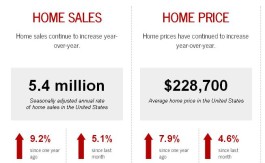Home prices in the nation’s largest metro areas jumped sharply in August, but the rate of increases is slowing, according to a leading gauge.
The Standard & Poor’s/Case-Shiller index of home prices in 20 large U.S. metros rose 1.3% from July and 12.8% from August 2012, beating the expectations of analysts who predicted weaker price gains. Prices haven’t risen so fast on a year-over-year basis since February 2006.
Even so, the rapid price increases that characterized many major markets this year appear to be easing. Sixteen cities saw month-over-month increases slow in August compared with July. Case-Shiller’s national 20-city index shows month-over-month gains during this recovery peaking in April.
“The housing market came into the year very strongly,” said Mark Zandi, chief economist at Moody’s Analytics. “It’s ending the year more meekly.”
The housing recovery kicked into overdrive this year as families and investors jumped into the market, convinced the bottom had passed. Prices shot up quickly as buyers battled over a shortage of homes for sale, raising concerns that a bubble could form in some hot markets, such as Las Vegas and Los Angeles.
But the supply of homes has expanded and some buyers have stopped home shopping, frustrated or priced out by rising values. Investors who once saw bargains everywhere have pulled back, just as more owners have listed their homes, hoping to cash in on higher prices.
The Case-Shiller index, created by economists Karl E. Case and Robert J. Shiller, is widely considered the most reliable read on home values. The housing index compares the latest sales of detached houses with previous sales and accounts for factors such as remodeling.
Las Vegas had the largest annual increase in August, at 29.2%, in large part because investors have gobbled up homes there to rent or flip. In San Francisco, prices jumped 25.4%; in Los Angeles, 21.7%; in San Diego, 21.5%.
“Although more homes are for sale, inventory hasn’t expanded enough to bring home-price gains back down to anywhere near normal pace,” Trulia chief economist Jed Kolko tweeted after the data were released Tuesday.
All 20 metros saw prices climb in August compared with July, but most rose at a slower pace. In the Los Angeles metro area, which includes Orange County, prices increased 2% in August, compared with 2.1% in July and 2.3% in June.
The Case-Shiller index, however, tends to trail other market indicators. The index covers three months of data, so August’s figure reflects purchases in June and July, as well as August.
More recent data have shown a sharper cooling.
Americans signed fewer contracts for previously owned homes in September than in any month since December, the National Assn. of Realtors said Monday. New home sales have also been weak, although September data have yet to be released because of the partial government shutdown. In Southern California, the median home price stayed essentially flat for the third straight month in September, according to research firm DataQuick.
“The buyers have slowed down,” said real estate agent Maxine Golden, who specializes in Newport Beach and Irvine.
In the spring, bidding wars became so fierce that homes often sold for far beyond the asking price. Now, Golden said, there are often price reductions.
The housing market usually cools in the fall and winter as many families opt against making a move with their children back in school and the holidays approaching. But most experts say larger market forces — such as higher home prices, coupled with meager income growth — have also hurt demand. In addition, mortgage rates have risen sharply since May, though they have eased recently.
Tight access to credit and higher flood insurance rates have also made buying harder for some home shoppers, said IHS Global Insight economists Stephanie Karol and Patrick Newport. But the economists said housing prices would continue to rise despite those factors and declining affordability.
“We expect home prices to decelerate, but solid growth should continue into next year,” they wrote in an emailed analysis.
The real question, Zandi said, is whether first-time home buyers will step into the market as investors pull away.
“That is a key to a continuing housing recovery,” Zandi said.







